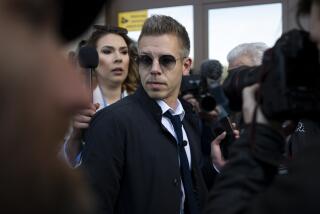From the archives: ‘Bad Old Days’ Not Forgotten
BUDAPEST, Hungary -- Tivador Partai, the president of the revived Smallholders Party in Hungary, is 80 years old. His study in the old house in the Buda hills where he has lived most of his life is lined with books and mementos, portraits of long-dead heroes and framed photos of political allies, snapshots taken back when their hair was thick and their hopes were high.
“I am old and sick now,” he said recently in an interview, the tone in his deep voice one not of self-pity but of straightforward reality. “And my biggest worry is that I will not see the outcome of all this, I will not see the others who will follow me.”
There is a concern, too, that the others should not have to follow where he was once forced to go--four years in a Communist work camp and two more years in prison.
Those were the “bad old days” in Hungary, and they seem almost impossible today. But they are the living memory of more than just this one man who, he says, has witnessed too many “world wars and revolutions and times of imprisonments and executions.”
At the moment, Partai’s Small-holders Party is not officially a party at all, but an “alternative organization,” one of about two dozen formed as a result of the Hungarian government’s steady movement toward a multi-party system.
Except for their counterparts in Poland, Communist leaders in Hungary are moving faster than in any other Soviet Bloc country toward power-sharing arrangements with opposition forces. By the end of this year, many of these “alternative organizations” will officially become political parties and begin preparing campaigns for elections in 1990.
One striking feature of the developing system is the caution displayed by the emerging parties--a caution that suggests how deeply Partai’s concerns are ingrained here, even among those whose memories do not stretch nearly as far back. Indeed, it is this caution, born largely of the tragic conclusion to the 1956 anti-Communist revolt, that may well account for Hungary’s successful advance along the road to reform.
Small Farmers, Businessmen
Some of the parties-to-be have a long history. The Smallholders go back to 1931, formed to represent small farmers and businessmen. In the first postwar elections in 1946, the Smallholders received 56% of the vote. But as Partai regretfully noted, the party was forced into a coalition with the Soviet-backed Communists, who had received only 13% of the vote, in keeping with the Yalta agreements that carved off Hungary into the Soviet camp.
“The liquidation of our party really began in 1947,” Partai recalled. “One of our leaders was taken away to the Soviet Union and did not come back.” By 1949, Partai himself was in the Recsk work camp, where he remained until after the death of Soviet dictator Josef Stalin in 1953. From 1960 until last December, the party, although not officially disbanded, was completely inactive.
Free Trade Advocates
In the view of most Hungarian political observers, it is unlikely that the Smallholders will regain the following they once had. Partai says the party’s goal is again to represent small farmers and businessmen, as well as small-scale entrepreneurs. The Smallholders will advocate the free trade of land and the restoration of “the spirit of private property” and will campaign against the bureaucracy, deeply entrenched after four decades of communism.
When asked if the Smallholders are “anti-Communist,” Partai hesitated before replying: “We are not for the Communists.”
A greater delicacy is applied to the question of withdrawal from the Soviet military alliance of the Warsaw Pact. “If the Soviet Union withdraws its troops from Hungary, then, step by step, we could move toward this idea of neutrality,” he said.
Along with representatives of other alternative groups, there is little doubt about where Partai really stands on the issue. But under current conditions, there is a limit to what can be said. Restraint and self-discipline are vital.
History Capricious
In Partai’s view, history is capricious, and Hungary’s situation may be more fragile than some imagine.
“The young ones, with their impatience, their rashness, their lack of memory, their very fearlessness,” make him wary, he said, adding: “It is enough to have one or two crazy people who can attract large numbers of people who are reckless. Some of them are career-makers who do not know the history and who care about nothing more than their ambitions.”
Hungary’s leaders in the party and the government reflect similar fears, and party councils are trying to ensure that the new system does not go too far, too fast.
‘Respect Alliances’
The consensus is that the new parties will have to “respect the nation’s alliances,” meaning that no party advocating withdrawal from the Warsaw Pact is likely to be legalized--even though it is generally assumed that most new parties eventually would strongly favor withdrawal.
Indeed, many questions remain about the new system, and the coming year will be of vital interest to the parties as procedures are set up to produce a new constitution, a two-house parliament and a court to decide constitutional questions.
Now, however, all those matters are up in the air. In an atmosphere of ferment and suspense, the most potentially powerful of the new organizations are beginning to churn out position papers, argue among themselves, plan strategy and anticipate the moves of the Communists, who, after all, are still in charge.
Guarantees Missing
“We don’t even know if we’re going to become a party,” Csaba Kiss, one of the leaders in the Hungarian Democratic Forum, said in a recent interview. “Right now, the legal guarantees are missing. We are operating in a kind of void.”
The MDF, as the organization is known by its Hungarian initials, has been described as “a group of populist intellectuals in search of a following.” At its first national convention, held in Budapest last weekend, delegates put off a decision on whether to become a party, with some arguing that the MDF’s “intellectual breadth” would be sacrificed in the transition to a competitive political organization.
But inflammatory rhetoric was noticeably absent from the proceedings.
“This is a very serious experiment, a historical experiment,” Kiss said. “We all remember the defeat of the revolution in 1956. We remember that we experienced no rescue from the West, that the United States gave priority to stability, and thereby to the continuing dependency of Hungary. We have lived through these tragedies of the last 40 years, and we do not wish to have a catastrophe here now.”
Youth Group Registers
Meanwhile, a youth group centered in the universities, the Federation of Young Democrats, also has registered as an alternative organization and is drawing strength from a successful campaign to remove the Russian language and Marxist-Leninist economics from the list of required studies.
Member Barath Gergely said the organization, with about 2,500 members, also is debating whether to become a full-fledged party, although some of its members have already decided to try for public office.
The two strongest tendencies in the group are led by “liberals and social democrats,” says Gergely, 22. Any Communist coloration in them is hard to find and, even though their membership is still small, Gergely says its attraction among university students far exceeds that of the official Young Communists League.
“The party has played out its cards over 40 years,” he said. “We could sit at the same table with them and negotiate, but we could never join them.”
Gergely’s words are like an echo across the generational gap. Laslo Hegedus, president of the People’s Party--or Peasants Party, as it was known before the Communist takeover--passes mildly over the period when “some members of our party were repressed.”
‘So Much Bitterness’
“As for bitterness,” he said, “we have as much as a politician can afford to have. There has been so much bitterness in our history that we cannot afford it. We have no illusions about our partners. We had some illusions in 1945. But we were very young at that time.”
Political observers say the Social Democrats, another newly formed group, may be the party with the greatest potential. Now 100 years old, the party was forcibly “unified” with the Communists in 1948, and its leaders were imprisoned and harassed for years.
Mihaly Revesz, 43, a professor of legal history, is the secretary of the party’s advisory group. His father was jailed for his party activities between 1950 and 1956, and his grandfather was active in the party as well.
“I’ve got a son,” Revesz said, “and he’s eager to get into politics. As for me, I’m just trying to hold onto my teaching post.”
Revesz said the Social Democrats have hopes of again becoming a broad-based party, but “after 40 years, it is hard to imagine that this can be the first or second party in Hungary. At the very beginning, we’d better be modest.”
Although it is true that people long ago lost trust in the Communist Party, the new parties might not be “ready to bear responsibility for a fragment of the government,” he said.
Teacher and Friend
Nor is the Communist Party the monolith it once was, Revesz said, explaining: “I can’t see any difference at the moment between me and Kalman Kulcar (the minister of justice, whose drafting of a potential constitution has been widely praised). He was my teacher, and he is my friend. I don’t know if he’s a member of the party or not. But I know we need a unified nation to enact reforms, and then to balance each other afterward.”
Revesz believes that a sense of balance in the coming months will be the key to Hungary’s success--and possibly to the direction of the rest of Eastern Europe.
“People would like to change without revolt, without violence,” he said. “In 1,000 years, we have tried to change our situation 10 or 12 times, and each time we failed. In this century, this will be our last chance. And we have to think of our children, so we must be very careful.”
He paused and smiled slyly: “This, I must tell you, is my own advice to myself.”
More to Read
Start your day right
Sign up for Essential California for news, features and recommendations from the L.A. Times and beyond in your inbox six days a week.
You may occasionally receive promotional content from the Los Angeles Times.






